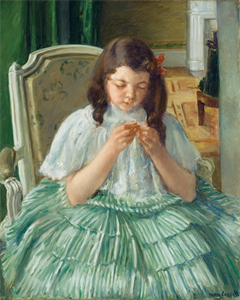
William Gropper
American, 1897–1977
William Gropper was one of the most prominent social activist artists of the mid-twentieth century. His childhood as the son of Jewish immigrants in New York’s impoverished Lower East Side engendered a deep compassion for the disenfranchised. The subjects of his cartoons, and his later paintings and drawings, were taken from his own experience of discrimination, corruption and poverty, particularly in the darkest days of the Great Depression.
Gropper left school at fourteen to help earn a living for his family by working in a clothing store. His sole escape was drawing and his most important art training came between the years 1912 and 1915, when he studied with the painters George Bellows (1882–1925) and Robert Henri (1865–1929) at the progressive Ferrer Center. His skills won him a scholarship to the National Academy of Design when he was nineteen. The New York Tribune hired Gropper as an illustrator about 1919, and he later contributed illustrations and satirical cartoons to other periodicals such as Vanity Fair and the leftist publication The New Masses. It was in his role as a cartoonist/commentator that he earned his living throughout the 1920s and 1930s, creating paintings privately until he was awarded public mural commissions with the Treasury Relief Project during the New Deal period.
American, 1897–1977
Sabbath
Object Type:
Painting
Dimensions:
28 in. x 18 in. (71.12 cm x 45.72 cm)
Medium and Support:
Oil on canvas
Accession Number:
2007.0015
Credit Line:
Gift of Babette L. and Charles H. Wampold in memory of Marie U. Levy and Jerome M. Levy and Selma M. Wampold and Charles H. Wampold, Sr.
William Gropper was one of the most prominent social activist artists of the mid-twentieth century. His childhood as the son of Jewish immigrants in New York’s impoverished Lower East Side engendered a deep compassion for the disenfranchised. The subjects of his cartoons, and his later paintings and drawings, were taken from his own experience of discrimination, corruption and poverty, particularly in the darkest days of the Great Depression.
Gropper left school at fourteen to help earn a living for his family by working in a clothing store. His sole escape was drawing and his most important art training came between the years 1912 and 1915, when he studied with the painters George Bellows (1882–1925) and Robert Henri (1865–1929) at the progressive Ferrer Center. His skills won him a scholarship to the National Academy of Design when he was nineteen. The New York Tribune hired Gropper as an illustrator about 1919, and he later contributed illustrations and satirical cartoons to other periodicals such as Vanity Fair and the leftist publication The New Masses. It was in his role as a cartoonist/commentator that he earned his living throughout the 1920s and 1930s, creating paintings privately until he was awarded public mural commissions with the Treasury Relief Project during the New Deal period.
Keywords
Click a term to view the records with the same keyword
Portfolio List
Click a portfolio name to view all the objects in that portfolio
This object is a member of the following portfolios:
Your current search criteria is: Keyword is "GC".

 by Artist (31)
by Artist (31)
